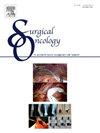盆腔淋巴结切除术与直肠癌:综述
IF 2.4
4区 医学
Q3 ONCOLOGY
引用次数: 0
摘要
扩大盆腔淋巴结清扫术(EPLND)治疗直肠癌在亚洲国家很常见,以减少局部复发和提高生存率。本综述调查了在标准全肠系膜切除术(TME)实践中增加扩大淋巴结切除术的益处。我们对PubMed、Scopus和Web of Science进行了全面的检索,以确定EPLND在直肠癌手术中的作用的系统综述和荟萃分析。主要结局为局部复发和总生存期;次要结果包括:手术时间、出血量、尿功能障碍和性功能障碍。在筛选的953篇文章中,有12篇符合纳入标准。中位随访时间为52个月。在总生存率方面,有10项研究发现EPLND组无统计学差异;只有两名患者的5年生存率有显著提高。9项研究发现EPLND在预防局部复发方面没有显著的益处,而2项研究表明局部晚期癌症患者在新辅助放化疗后有益处。在大多数研究中,EPLND组的手术时间和出血量更高。EPLND与泌尿和性功能障碍的几率增加有关,六项研究中有四项报告了这两种结果的较高发生率。我们的分析得出结论,EPLND在局部复发、总体生存或次要结局(包括泌尿和性功能障碍风险增加、手术时间延长和出血量增加)方面没有比单独的TME有额外的好处。本文章由计算机程序翻译,如有差异,请以英文原文为准。
Extended pelvic lymphadenectomy and rectal cancer: An umbrella review
Extended pelvic lymph node dissection (EPLND) for rectal cancer is common in Asian countries to reduce local recurrence and improve survival. This umbrella review investigates the benefit of adding extended lymphadenectomy to the standard total mesorectal excision (TME) practice. We conducted a comprehensive search of PubMed, Scopus, and Web of Science to identify systematic reviews and meta-analyses examining the role of EPLND in rectal cancer surgery. Primary outcomes were local recurrence and overall survival; secondary outcomes included: operation time, blood loss, urinary dysfunction, and sexual dysfunction. Of the 953 articles screened, 12 met the inclusion criteria. The median follow-up time was 52 months. In terms of overall survival, 10 studies found no statistically significant difference in the EPLND group; only two showed a significant improvement in 5-year survival. Nine studies found no significant benefit of EPLND in preventing local recurrence, while two suggested benefits for patients with locally advanced cancer after neoadjuvant chemoradiotherapy. In most studies, operation time and blood loss were higher in the EPLND group. EPLND was associated with increased odds of urinary and sexual dysfunction, with four out of six studies reporting higher rates for both outcomes. Our analysis concludes that EPLND offers no additional benefit over TME alone in terms of local recurrence, overall survival, or secondary outcomes, including increased risks of urinary and sexual dysfunction, longer operation times, and greater blood loss.
求助全文
通过发布文献求助,成功后即可免费获取论文全文。
去求助
来源期刊

Surgical Oncology-Oxford
医学-外科
CiteScore
4.50
自引率
0.00%
发文量
169
审稿时长
38 days
期刊介绍:
Surgical Oncology is a peer reviewed journal publishing review articles that contribute to the advancement of knowledge in surgical oncology and related fields of interest. Articles represent a spectrum of current technology in oncology research as well as those concerning clinical trials, surgical technique, methods of investigation and patient evaluation. Surgical Oncology publishes comprehensive Reviews that examine individual topics in considerable detail, in addition to editorials and commentaries which focus on selected papers. The journal also publishes special issues which explore topics of interest to surgical oncologists in great detail - outlining recent advancements and providing readers with the most up to date information.
 求助内容:
求助内容: 应助结果提醒方式:
应助结果提醒方式:


